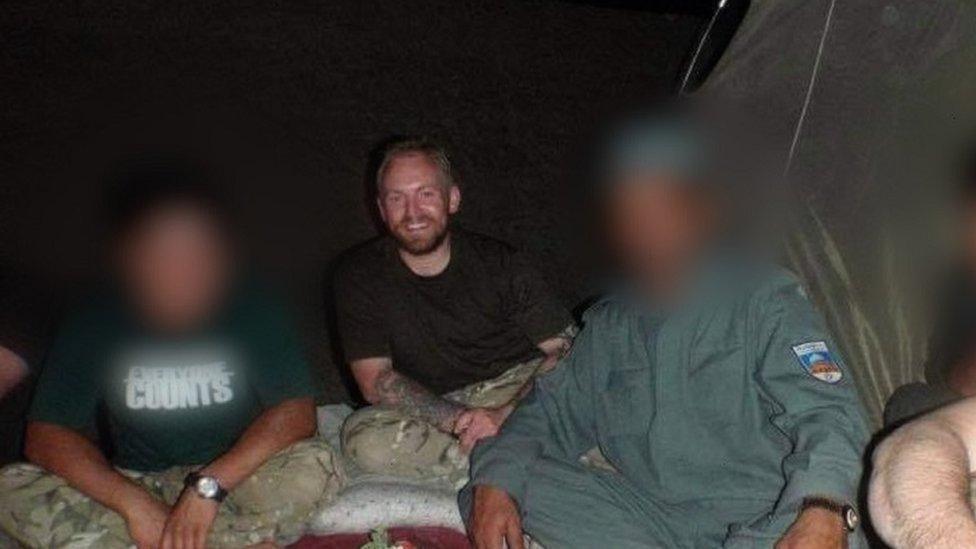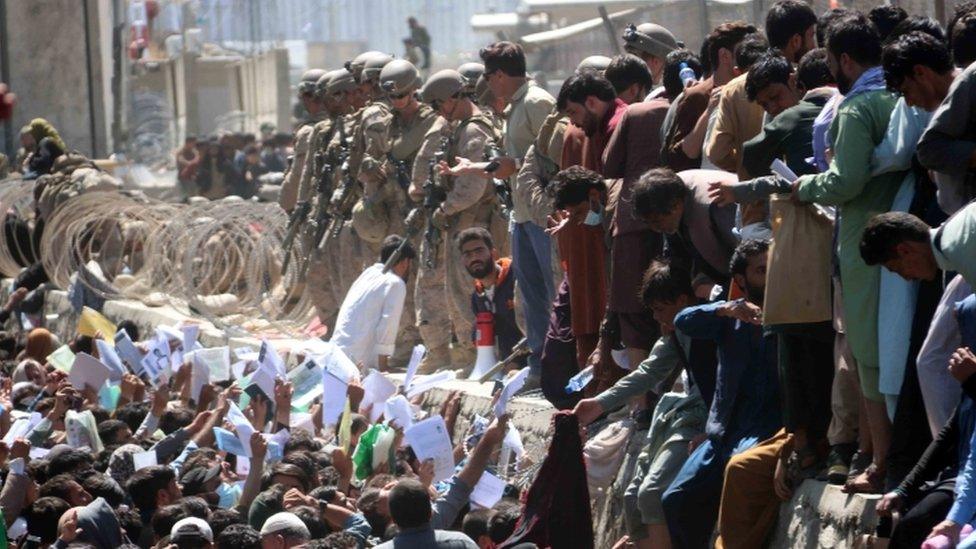Afghanistan: Tim McCullough quits navy over UK refugee response
- Published

Tim McCullough (centre) worked with Afghan interpreter Bilal when he served in Helmand province in 2012
A Northern Ireland veteran of the War in Afghanistan has resigned from the Royal Navy over the government's response to resettling Afghans who worked with British forces.
Tim McCullough served in Helmand province in 2012, where he worked with a then 18-year-old Afghan interpreter.
Mr McCullough said: "Afghanistan is the biggest betrayal and dereliction of duty to human life I've witnessed."
He told BBC News NI it was "not right" to "leave these people behind".
The British government said it had worked tirelessly to evacuate tens of thousands of Afghans.
"We have asked so many people to look after us and the world which we go into and we expect and we trust them to do that and now we have pulled out," he said.
"America and Britain have left these people behind and I could not carry on doing what I am doing based upon the way in which we leave these people behind.
"It is just not right, that's not what we do, that's not the military service I joined.
"When I joined the Royal Navy, we always looked after those who looked after us, and now we are not doing that."
'Delighted to see them safe'
Mr McCullough, from Bangor, County Down, served with Afghan interpreter Bilal.
The interpreter moved to Australia but was later told he had one month to return to Afghanistan or the Taliban would kill his family.
The family have since been evacuated to the Republic of Ireland, with Mr McCullough instrumental in co-ordinating the evacuation and visa process.
Bilal's family were granted refugee status in Ireland after a joint effort by the British and Irish governments to have them evacuated safely from Afghanistan.
Mr McCullough said on Wednesday that Bilal's family were now living in Ireland and had forged a close bond with a young Afghan doctor.
"I am going down to see them this weekend and I am delighted to see them safe," he added.
"[The doctor] is effectively part of the family, they have totally taken her in."

There was an international effort to get people out of Afghanistan in the wake of the Taliban takeover
In response to Mr McCullough's claims, a Ministry of Defence spokesperson said that during Operation Pitting, external it had "worked tirelessly to safely evacuate as many people out of Afghanistan as possible, airlifting more than 15,000 people from Kabul including thousands of ARAP (Afghan Relocations and Assistance Policy) applicants and their dependants".
The spokesperson added: "We will continue to do all we can to support those who have supported us, and our commitment to those who are eligible for relocation is not time-limited and will endure.
"The ARAP scheme remains open to applications and we will continue to support those who are eligible."
A Home Office spokesperson said the UK had "a proud history of providing protection to those who need it and through the new Afghan Citizens' Resettlement Scheme up to 20,000 people most in need will be welcomed to the UK".
They added: "It will prioritise those who have assisted the UK efforts in Afghanistan and stood up for values such as democracy, women's rights and freedom of speech, rule of law as well as vulnerable people, including women and girls at risk and members of minority groups."
Related topics
- Published30 August 2021

- Published29 August 2021

- Published27 August 2021

- Published23 August 2021
